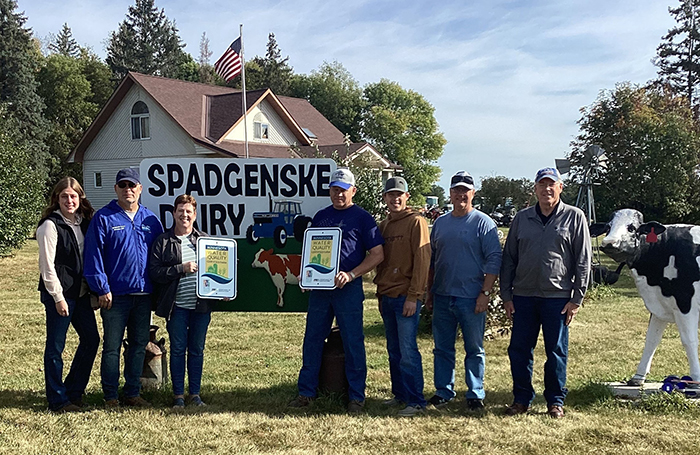Spadgenske dairy farm becomes water quality certified
News | Published on October 8, 2024 at 5:41pm EDT | Author: frazeevergas
0
The Spadgenske Dairy Farm, in rural Menahga, has recently become water quality certified under the Minnesota Agricultural Water Quality Certification Program (MAWQCP).
Mark, Mike and Kristine Spadgenske, proud owners of the Spadgenske Dairy Farm, have recently become water quality certified under the Minnesota Agricultural Water Quality Certification Program (MAWQCP).
The decade-old program is a voluntary opportunity that certifies farmers taking the lead in instigating conservation-minded practices to protect water quality. The Spadgenskes’ 1,500-plus acre dairy farm achieved certification in September of this year, accompanying over 1,400 certified producers farming over one million accredited acres within the program.
“We were already applying the practices MAWQCP requires so consumer awareness is a big reason we moved ahead with the certification process,” Kristine said. “The certification allows us to rekindle those conservations of where food comes from and replace misinformation with facts within the local community.”
The Spadgenske Dairy Farm is a row crop, hay, pasture, and dairy cattle farming operation run by Mark, Mike (Mark’s twin brother), Kristine, and their family in Becker County.
They raise approximately 800 head of dairy cattle, including 300 dairy cows on several pastures and their feedyard. During the growing season, the Spadgenskes rotate the young stock and calves between pastures, excluding them from access to the Kettle River, which meanders within Runeberg and Spruce Grove townships.
On their cropland, the Spadgenskes implement no-till farming and cover crops in their corn silage and alfalfa rotation with the cover crops being flown on by drones or planted with a High Boy seeder. For approximately three years, they grow corn silage with a multi-species cover crop being planted after each harvest. After the harvest of the third year though, rye is planted as a cover and harvested the following year for grain. Afterward, they seed down alfalfa which is maintained for roughly six years before being terminated to restart the cycle.
By definition, cover crops are any non-cash crop grown besides the primary cash crop. These crops have the potential to increase soil organic matter, reduce erosion, improve soil structure, and promote water infiltration. No-till farming also accredits these same benefits because the no-till drill plants without tilling the soil, which decreases disturbance and increases soil health.
“We take pride and are humbled by how we farm because we believe dairy farming was sustainable before sustainability became a thing,” said Kristine. “And in the end, we’re only borrowing the land, so leaving it better than how we found it is the right thing to do.”
Overall, the combination of no-till, cover crops, and good pasture management in addition to proper manure and pest management, the Spadgenske Dairy Farm helps protect our soil and water resources where soil erosion is prevented, and water quality is preserved.
For more information about the Minnesota Agricultural Water Quality Certification Program, contact the East Ottertail Soil and Water Conservation Office at (218) 346-9105 or visit their website: www.eotswcd.org.

